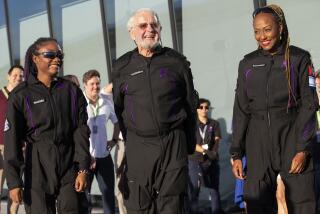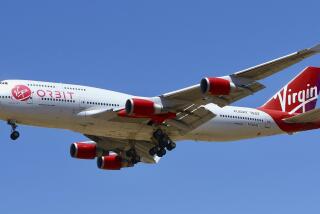Firm Books Space for TV Contestants
- Share via
COLOGNE, Germany — Who wants to be a millionaire--and a world-famous space traveler?
A television company in this German media capital reckons there are untold thousands, if not millions, with that dual desire. It has purchased seven seats on Russian rockets to the International Space Station as prizes in a forthcoming TV competition.
The creators of the Space TV production company are also negotiating with networks in the United States, Japan, Latin America and elsewhere in Europe to run simultaneous national contests to make the battle for the space trips an international adventure.
“We want to commercialize and popularize space travel,” says Joerg Grabosch, chief executive officer of Space TV’s parent company, Brainpool, which has purchased exclusive rights to commercial “taxi rides” for civilians aboard Soyuz rockets. “For many people around the world, the most memorable event in their lives was the [1969] moon landing. This project should create new enthusiasm for going into space.”
But he and his fellow developer of the “Space Commander” television series, Josef Kind of the Astrium aerospace contracting giant, concede that the competition’s appeal lies in its promise of fame and fortune for the winners.
Besides generating revenue through franchises and advertising, the program will hold viewer lotteries to raise enough money for all five finalists for each trip to return from Russian space training as millionaires. The lotteries will also pay viewers who correctly guess each contest’s winner.
Beginning in April, “Space Commander” will run recruitment camps at space exhibitions and film festivals around the world. Grabosch says that, based on the interest shown for other adventure contests, he expects about 60,000 applicants from Germany and more in the United States.
“It’s realizable and highly serious,” insists Kind, whose Bremen-based firm is a subsidiary of the European Aeronautic Defense & Space Co. Astrium maintains a life-size International Space Station mock-up, at which contestants late in the series will spend two weeks to test their endurance.
Applicants must be at least 23 years old, under 6 feet 2 inches tall and weigh no more than 187 pounds. Culling the initial entries will involve some subjective criteria to pare down each national competition to 6,000, Grabosch says. Those doing the vetting will strive to balance genders, professions, ages and other demographics to reflect those of the viewers, he adds.
Interviews and physical testing will reduce the number of contestants for televised semifinals to 600. Those people will then be divided into groups of 10 for quiz-show competitions and narrowed to 60 for physical stress tests. The final 15 will spend two weeks aboard the space station prototype at Astrium’s Bremen headquarters, during which viewers will monitor them “Big Brother”-style and vote on who will go to Russia for six months of training.
Russian Space Agency officials, who will be responsible for preparing the five finalists in the Russian language and the basics of spaceflight, will have authority to remove anyone considered ill-equipped. Two weeks before the September 2002 launch, viewers will choose a winner and a backup for the first seat on a Soyuz.
The creators of “Space Commander” bridle at comparisons with the “Survivor” television contest, but the two have much in common. The space contest, however, has the added risk of any business venture connected with volatile Russia.
Brainpool has so far invested only $7.5 million--paid to the Russian Space Agency for the Soyuz trips. But launch fees and 18 months of production expenses leading up to the first flight could cost as much as $46 million, project spokeswoman Susanne Loesser says.
But those looking for couch potatoes with the right stuff insist that the programs will be self-financing after the first launch--when many more viewers realize that they too could be a space traveler and a millionaire.
More to Read
The complete guide to home viewing
Get Screen Gab for everything about the TV shows and streaming movies everyone’s talking about.
You may occasionally receive promotional content from the Los Angeles Times.







